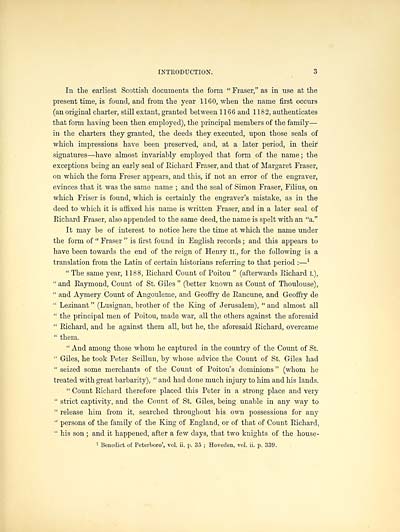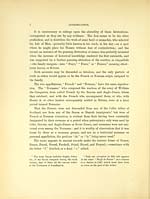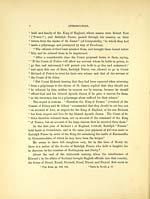Frasers of Philorth > Volume 1
(31)
Download files
Complete book:
Individual page:
Thumbnail gallery: Grid view | List view

INTRODUCTION. 3
In the earliest Scottish documents the form "Eraser," as in use at the
present time, is found, and from the year 1160, when the name first occurs
(an original charter, still extant, granted between 1166 and 1182, authenticates
that form having been then employed), the principal members of the family —
in the charters they granted, the deeds they executed, upon those seals of
which impressions have been preserved, and, at a later period, in their
signatures — have almost invariably employed that form of the name; the
exceptions being an early seal of Eichard Eraser, and that of Margaret Fraser,
on which the form Freser appears, and this, if not an error of the engraver,
evinces that it was the same name ; and the seal of Simon Fraser, Filius, on
which Friser is found, which is certainly the engraver's mistake, as in the
deed to which it is affixed his name is written Fraser, and in a later seal of
Richard Fraser, also appended to the same deed, the name is spelt with an "a."
It may be of interest to notice here the time at which the name under
the form of " Fraser " is first found in English records ; and this appears to
have been towards the end of the reign of Henry n., for the following is a
translation from the Latin of certain historians referring to that period : — 1
" The same year, 1188, Eichard Count of Poitou " (afterwards Eichard I.),
" and Eaymond, Count of St. Giles " (better known as Count of Thoulouse),
" and Aymery Count of Angouleme, and Geoffry de Eancune, and Geoffry de
" Lezinant " (Lusignan, brother of the King of Jerusalem), " and almost all
" the principal men of Poitou, made war, all the others against the aforesaid
" Eichard, and he against them all, but he, the aforesaid Eichard, overcame
" them.
" And among those whom he captured in the country of the Count of St.
" Giles, he took Peter Seillun, by whose advice the Count of St. Giles had
" seized some merchants of the Count of Poitou's dominions " (whom he
treated with great barbarity), " and had done much injury to him and his lands.
" Count Eichard therefore placed this Peter in a strong place and very
" strict captivity, and the Count of St. Giles, being unable in any way to
" release him from it, searched throughout his own possessions for any
" persons of the family of the King of England, or of that of Count Eichard,
" his son ; and it happened, after a few days, that two knights of the house-
1 Benedict of Peterboro', vol. ii. p. 35 ; Hoveden, vol. ii. p. 339.
In the earliest Scottish documents the form "Eraser," as in use at the
present time, is found, and from the year 1160, when the name first occurs
(an original charter, still extant, granted between 1166 and 1182, authenticates
that form having been then employed), the principal members of the family —
in the charters they granted, the deeds they executed, upon those seals of
which impressions have been preserved, and, at a later period, in their
signatures — have almost invariably employed that form of the name; the
exceptions being an early seal of Eichard Eraser, and that of Margaret Fraser,
on which the form Freser appears, and this, if not an error of the engraver,
evinces that it was the same name ; and the seal of Simon Fraser, Filius, on
which Friser is found, which is certainly the engraver's mistake, as in the
deed to which it is affixed his name is written Fraser, and in a later seal of
Richard Fraser, also appended to the same deed, the name is spelt with an "a."
It may be of interest to notice here the time at which the name under
the form of " Fraser " is first found in English records ; and this appears to
have been towards the end of the reign of Henry n., for the following is a
translation from the Latin of certain historians referring to that period : — 1
" The same year, 1188, Eichard Count of Poitou " (afterwards Eichard I.),
" and Eaymond, Count of St. Giles " (better known as Count of Thoulouse),
" and Aymery Count of Angouleme, and Geoffry de Eancune, and Geoffry de
" Lezinant " (Lusignan, brother of the King of Jerusalem), " and almost all
" the principal men of Poitou, made war, all the others against the aforesaid
" Eichard, and he against them all, but he, the aforesaid Eichard, overcame
" them.
" And among those whom he captured in the country of the Count of St.
" Giles, he took Peter Seillun, by whose advice the Count of St. Giles had
" seized some merchants of the Count of Poitou's dominions " (whom he
treated with great barbarity), " and had done much injury to him and his lands.
" Count Eichard therefore placed this Peter in a strong place and very
" strict captivity, and the Count of St. Giles, being unable in any way to
" release him from it, searched throughout his own possessions for any
" persons of the family of the King of England, or of that of Count Eichard,
" his son ; and it happened, after a few days, that two knights of the house-
1 Benedict of Peterboro', vol. ii. p. 35 ; Hoveden, vol. ii. p. 339.
Set display mode to:
![]() Universal Viewer |
Universal Viewer | ![]() Mirador |
Large image | Transcription
Mirador |
Large image | Transcription
Images and transcriptions on this page, including medium image downloads, may be used under the Creative Commons Attribution 4.0 International Licence unless otherwise stated. ![]()
| Histories of Scottish families > Frasers of Philorth > Volume 1 > (31) |
|---|
| Permanent URL | https://digital.nls.uk/96565872 |
|---|
| Attribution and copyright: |
|
|---|
| Description | A selection of almost 400 printed items relating to the history of Scottish families, mostly dating from the 19th and early 20th centuries. Includes memoirs, genealogies and clan histories, with a few produced by emigrant families. The earliest family history goes back to AD 916. |
|---|

